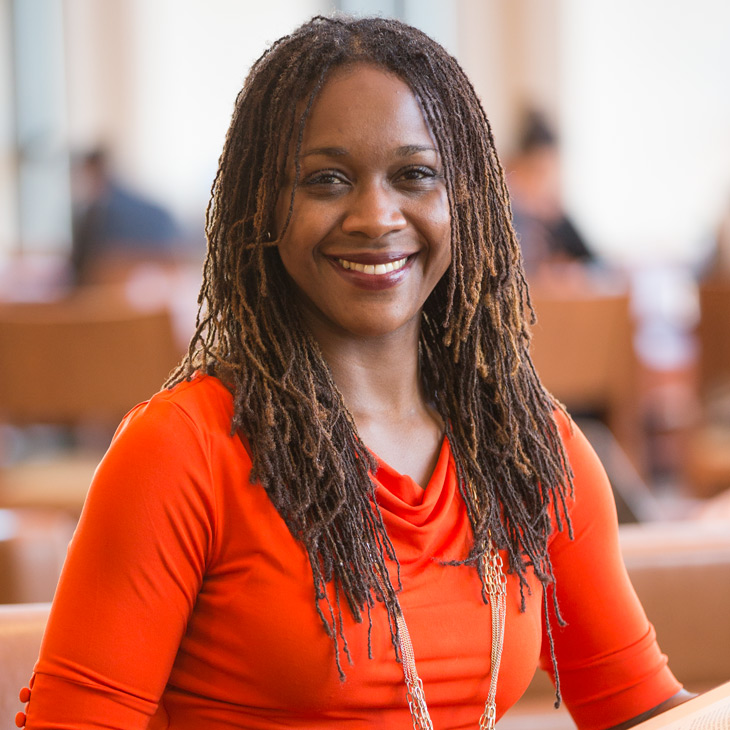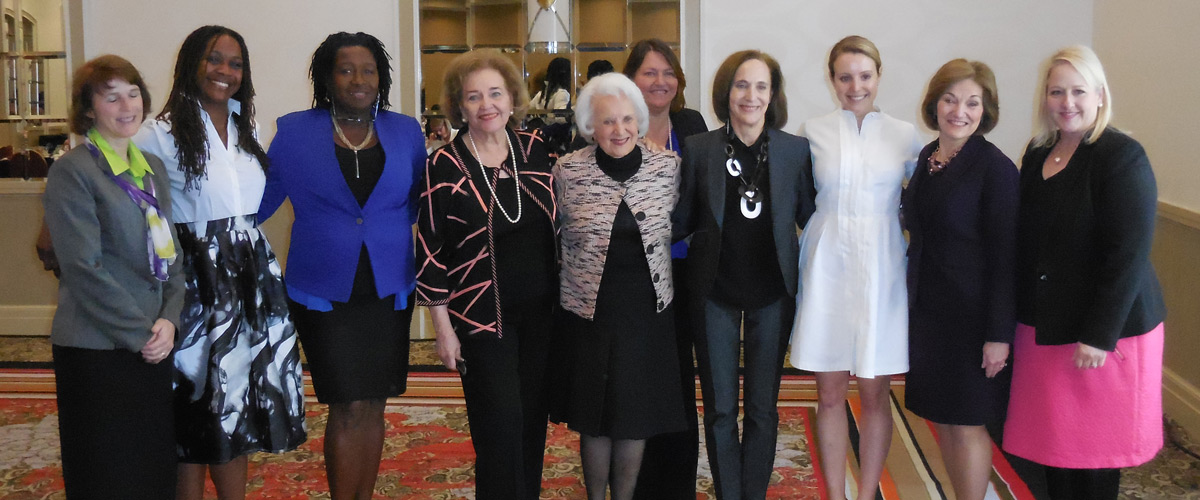Finding Answers
By Dollie Elliott
Students initially attending Lex Smith’s Managing Diversity in the Workplace (MGMT4213) class often mistake her for a well-dressed student. But once she begins talking, she quickly gains their attention — with her New York accent — and politely commands their respect, exuding the confidence of a tenure-track professor.
Alexis Nicole Smith, or Lex to her colleagues and friends and Nikki to her family, is passionate about two things: interacting with her students and conducting research in organizational behavior. Research — or as she says, “asking questions and finding answers” — is what she most enjoys as an assistant professor in the Department of Management at Oklahoma State.
“I chose this career in part because of a fundamental curiosity about human nature and how the answers we find can be used to improve workplaces and communities,” Smith says.
“I enjoy teaching bright and motivated people, and I love the college stage of life. For many doing the traditional route, it’s their first opportunity to discover themselves in an entirely new context, surrounded by a bunch of different types of people and engaging in a higher level of education and experience. I think it is one of the most exciting and influential periods of life, and I like that I get to play a part in it.”

She also finds working alongside her colleagues in the Spears School of Business beneficial. “There is a camaraderie that is comforting. I find being able to pop down to my colleagues’ offices for a quick question or just to chat invigorating,” Smith says. “It’s an awesome place to work.”
Smith earned a bachelor’s degree in psychology from Rice University and a doctorate in organizational behavior, also known as management, from Tulane University. She joined the Spears School faculty in the summer of 2012 to study gender and diversity in the workplace.
Smith is one of those people who are very well put-together, seeming to manage her teaching, research and home life with great poise. So it should be no surprise that even when she was a young child, she knew she wanted to teach. She dreamed of becoming a college professor — or at least a teacher — just like her favorite aunt, Pam, who was a fourth-grade teacher.
She took an AP psychology class in high school and knew it would be her college major. At Rice, she shadowed her favorite psychology professor, Mikki Hebl, as she worked in her social and industrial organization psych research lab.
“This is where I learned what it meant to be a college professor,” she says. “Her time and commitment to research, as well as her focus on an approachable, engaging classroom style, and her dedication to her students at all levels was an inspiration to me and my primary model for my work life now.”
Smith’s research focuses on gender and diversity at work. She has several project streams within that general umbrella, but she most enjoys her research that involves women’s leadership and influence styles.
On one project, she and her colleagues collected hundreds of interviews focused on women as change agents and innovation leaders.
“These interviews became the centerpiece for some corporate work we’d been doing on identifying and developing global leadership skills among female executives,” Smith says.
“Our research goals aim to uncover and investigate the challenges unique to women as they face the double bind of being tokens in traditionally male-dominated industries and occupations. And more importantly, we seek to identify and advocate the tools that successful women have used to rise to and thrive in executive leadership roles.”
In another stream of research, Smith examines how men and women influence through very different, subtler means.
“I examine attractiveness, charm and flirtation at work as a means of managing impressions. Although we may commonly expect men and women to flirt in certain social domains, the workplace is one setting wherein we routinely police interpersonal flirtation — for many good reasons, sexual harassment and abuse of power being chief among them,” she says.
“However, men and women often rely on charm and even mild flirtation to gain favor with others who they rely on to get work done. My research question is what happens when men and women do charm or flirt at work, and what influences these outcomes? We have been finding very interesting results wherein women who flirt are penalized in a variety of ways, but these penalties are not applied to men — even when they assertively flirt.”
The group’s findings suggest that women who are attractive, charming and flirtatious at work run the risk of being typecast as the office vixen who is not to be trusted. “Overall, I hope my research sheds light on the many opportunities and threats men and women face when working in increasingly diverse organizations,” Smith says.

OSU was recently honored for its diversity efforts and praised as an exemplary model by the National Association of Diversity Officers in Higher Education.
“Completely diversifying an organization is a difficult task to do in just a few years or in some cases decades, but OSU has contributed a lot of attention and resources to increasing diversity amongst the student body and the faculty and staff. While I think that those efforts are the beginning of something great, there is still a lot more to do. We have seen huge increases in the number of diverse students who attend OSU but are still working on improving the number of students we graduate — students of color in particular,” Smith says.
“I do think that in terms of accessibility and international diversity, OSU is making really good strides, and some programs do better than others. I think the issue for OSU is going to be more about understanding the culture and how well or poorly students feel that they are being integrated and included in some of the major functions. Not just classes but the extramural activities, extracurricular life and the social fabric of the university. That’s the kind of fact-finding mission that is more of a culture study rather than just numbers.
“It starts with the ability to walk through a student center and see groups socializing with one another across social, racial or cultural identities. It’s integration across multiple levels at events and activities that students choose.
“Part of the college experience is to open you up to a world that is beyond the one where you grew up,” she says. “I think that’s a big part of the mission here.”
For the past few years, Smith has been the moderator of the Women’s Business Leadership Conference hosted by the OSU’s Center for Executive and Professional Development. “Every year, OSU invites five or six extraordinary women who have started their own business or been first women leaders of their companies or even industries. Stories are often about their personal struggles and resiliency, inspiring stories that other women can identify with,” says Smith.
She is very organized. She has teaching days and research days. She divides her schedule to protect her time with students and her research efforts. “I say no to a lot of things that I would love to engage in,” Smith says. “But I keep a notebook full of ideas and plans — to be revisited as soon as time makes itself available.”
As busy as she gets, she prefers Stillwater’s pace to New York’s. “I love home (New York), but in my experiences elsewhere, I discovered that I enjoy a quieter style and pace of life. In addition, I’d do just about anything I can to avoid living in any place with a proper winter,” she says. “I have thrown away my snow boots and am not looking back.” She and her four siblings were raised between Queens and Brooklyn.
To relax, Smith goes for a run in her neighborhood. And “Sunday Funday” activities top her list of fun things. Once a week, she and other single parents alternate hosting dinners that include their children.
“We potluck or make food, and the kids hang out in my back yard with the animals,” Smith says. Those animals include a dog, fish, bunny and four chickens. She and her 6-year-old daughter, Chloe, are raising chickens.
Smith got the idea to raise chickens from a colleague. “My family back home laughs about the chickens. When I got them, I thought to myself, I live in Oklahoma. Why not have some chickens? I want to do as the Oklahomans do,” Smith laughs. “I learned that the whole process is actually very simple, and there are lessons to be learned by sustaining farm animals in your backyard, but they are a lot of fun. And Chloe running after the chickens is always the highlight of Sunday Funday. That’s what it’s all about. At the end of the day, it’s about having people in your circle who you can rely on, laugh with and who recharge your batteries.”

